EmbRACE Update - Worldwide Festivals 🌍

This article will take approximately 1 minute to read
Published 6 Dec 2022 in Raising Awareness
Each month we will be sharing information on the many celebrated Worldwide Festivals. Developed by our very own EmbRACE Working Group Colleague, Mandy Kaur, have a read of December's update. Plus take part in our ‘I speak another Language’ Badge survey.
As the countdown for Christmas is upon us, let's take a look at some other celebrations this month!

8th December – Bodhi Day– Day of Enlightenment![]()
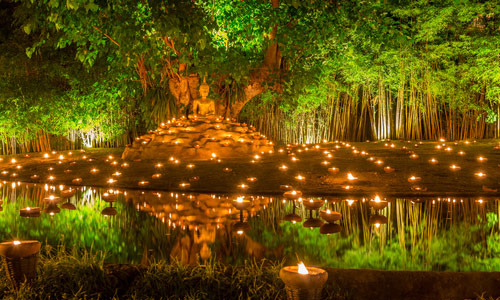
Mainly celebrated in North India, Bodhi Day in Buddhism is when Gautama received enlightenment and is celebrated by many Buddhists in the world. According to early Buddhist scripture, the historical Buddha was a prince named Siddhartha Gautama who was disturbed by thoughts of sickness, old age, and death. He gave up his privileged life to become a homeless vagabond, seeking peace of mind. After six years of frustration, he sat under a fig tree "bodhi tree" and vowed to remain in meditation until he had fulfilled his quest. During this meditation, he realized enlightenment and became the Buddha, or "the one who is awake." Bodhi Day generally is observed quietly, without parades or fanfare. Meditation or chanting practices may be extended. More informal commemoration might involve bodhi tree decorations or simple tea and cookies.
19th December 2022 – 26th December 2022 – Hanukkah ![]()
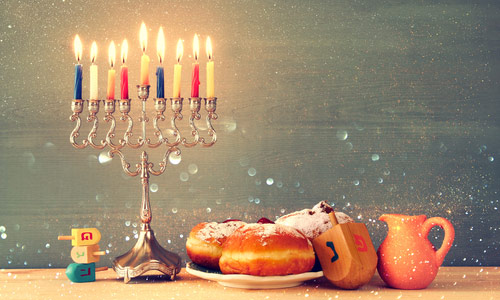
Hanukkah is a Jewish celebration that lasts 8 days, Hanukkah translates as ‘dedication’ and commemorates a that holiday took place during a particularly turbulent phase of Jewish history where Jews had risen up against their Greek-Syrian oppressors in the Maccabean Revolt. In 168 B.C., the Syrian king’s soldiers descended upon Jerusalem, massacring thousands of people and desecrating the city’s holy Second Temple by erecting an altar to Zeus. Led by the Jewish priest Mattathias and his five sons, a large-scale rebellion broke out, One of the sons Judah called on his followers to cleanse the Second Temple, rebuild its altar and light its menorah—the gold candelabrum whose seven branches represented knowledge and creation and were meant to be kept burning every night.
Judah and the other Jews who took part in the rededication of the Second Temple witnessed what they believed to be a miracle. Even though there was only enough untainted olive oil to keep the menorah’s candles burning for a single day, the flames continued flickering for eight nights, leaving them time to find a fresh supply. This wondrous event inspired the Jewish sages to proclaim a yearly eight-day festival.
21st December – Martyrdom of the Sahibzade – The sons of the Guru Gobind Singh Ji – 10th Guru ![]()
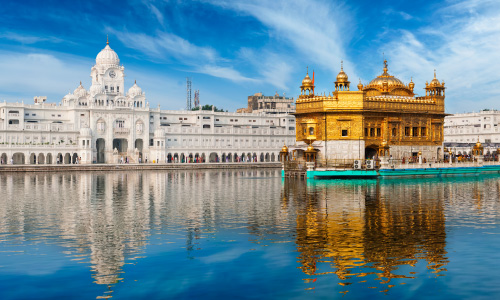
This day holds significance importance in the Sikh religion and is a day of remembrance. Guru Gobind Singh Ji, the tenth Sikh Guru had four sons. During the reign of the Mughal empire, the Guru’s two youngest sons Baba Zorawar (aged 9) and Baba Fateh Singh (aged 7) Ji were captured along with their grandmother Mata Gujri. After being locked away in a tower during a very cold wintery December and sleeping on a hard floor, the boys were taken and presented to a court full of noblemen and councilmen. It was there that they were ordered to bow in front of Nawab Wazir, a Governor of Sarhind, India. He promised them riches and rank if they would denounce their father's faith. He made it clear, however, that they had no other choice, and should otherwise surely face death. The sons immediately refused and responded by saying “We have been taught to bow to none but God and the Guru. We will not bow to the Nawab”. The Nawab would spend the next few days locking them in the tower and bringing them back out with the same offer but the their answers would remain the same. The Nawab ordered his men to build a wall with the boys still alive in it, they were told to take care that the bricks press wall and tightly against their bodies. A gurdwara now resides where this tragedy took place, and the original wall and tower is still there to see. It is a reminder to all Sikhs the importance of holding onto your faith even in the most difficult circumstances.
24th December – Christmas Eve – The story of Saint Nicholas![]()
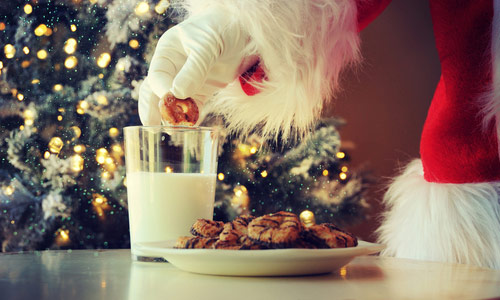
Do you leave a mince pie and milk out for Santa? Here’s another story behind the rosy cheeked, big belly man we adore. Saint Nicholas, otherwise known as Santa was a Bishop who lived in the fourth Century and was born in Turkey! The Saint was said to be quite rich after being left a considerable amount of money. Saint Nicholas was so generous and kind and was a very cherished member of the community, he would use his wealth to help the poor and give secret gifts to those who needed it the most. An example of this was an occasion when he helped a poor man who couldn’t afford to marry his daughters, one night Nicholas secretly dropped a bag of gold down the chimney and into the house. The bag fell into a stocking that had been hung by the fire to dry and just like that the tradition was born! His feast day is celebrated on the anniversary of his death, December 6. This was traditionally considered a lucky day to make large purchases or to get married and don’t forget.. there’s still time to be good to avoid a lump of coal in your stocking this Christmas!
25th December – Christmas Day ![]()

Christmas is a Christian festival intended to celebrate the birth of Jesus, the customs and traditions around this festival derive all the way back to the Roman era and the first recorded date of Christmas being celebrated on December 25th was in 336, during the time of the Roman Emperor Constantine who was the first Christian Roman Emperors. Over time, other traditions and cultures have laid foundation to how many of us celebrate today for example in Scandinavia, many people celebrate ‘Yule’ which is otherwise known as winter solace, Yule celebrations included bonfires, decorating with holly, mistletoe and the boughs of evergreen trees, ritual sacrifices, feasts, and gift-giving. Carol singing is said to originate from a separate tradition called ‘wassailing’ which existed as far back as Anglo-Saxon times. The word ‘wassail’ probably comes from ‘ves heill’ meaning ‘be well and in good health’ and was a toast. But by the Victorian period wassailers were carolling groups who went round the town and would be rewarded with a hot, spiced (often cider-based) drink, known as ‘wassail’. It is also said that the tradition of eggnog originated from the early medieval Britain “posset,” a hot, milky, ale-like drink. By the 13th century, monks were known to drink a posset with eggs and figs. Milk, eggs, and sherry were foods of the wealthy, so eggnog was often used in toasts to prosperity and good health. To find out more about how the world celebrates, feel free to click on the link here.
31st December – Omisoka – The last day of the year ![]()
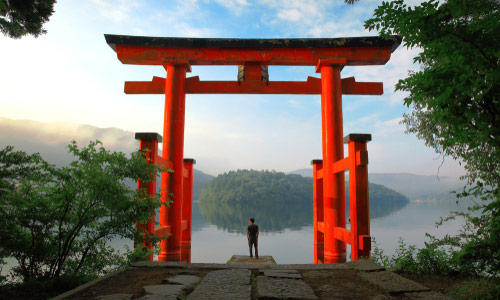
Omisoka is a huge Buddhist festival similar to New Year’s Eve, the celebration celebrates the last day of the year. The festival is a chance for people to prepare for the new year by cleansing Shinto home shrines and Buddhist altars. The bells of Buddhist temples are struck 108 times to warn against the 108 evils to be overcome. There is also a custom to eat soba noodle on Omisoka, soba noodle made from a buckwheat flour. The significance links to the belief that eating these noodles is a wish for living long life like a noodle and cutting a run of bad luck because soba noodle breaks more easily than other noodles
To all celebrating this month, I wish you all good health, treasured memories, a very Merry December and a Happy New Year!
In addition to these festivals, we also received a few festive mentions from colleague, Helen Walton:
Winter Solstice
This year the official winter solstice takes place on Wednesday 21 December 2022. In London, the sun will set at around 15:53, marking the shortest day and the longest night of the year. The winter solstice is a time to celebrate the rebirth of the sun, you can celebrate its life-giving powers by taking a sunset or sunrise walk to a local hilltop, your favourite shoreline or through winter fields, and reflect on the winter beauty of the world around you.
Many followers of ancient religions celebrate this festival as the turning point in the seasons, just as they do on the Summer solstice.
Yule is one of the oldest winter solstice festivals, starting at the Winter solstice and lasting for 12 days. Its origins are most known among the ancient Norse thousands of years ago. It was around the 9th Century that with the spread of Christianity across Europe, Yule was gradually incorporated into what became Christmas.
For Pagans, Yule is the second sabbat of the Wheel of the Year, marked with rituals to welcome the return of the Sun. Some mark the holiday with re-enactments of the battle between the Holly King (representing darkness) and the Oak King (representing light) of Celtic legend. Halls and homes were decorated with boughs of holly, Ivy and oak logs.
Like most winter solstice festivals, themes of light, fire, and feasting are common threads. The Yule Log now more commonly known as a chocolate dessert, was a large log, decorated with the greenery of holly, ivy and pine that burned throughout the entire multiday festival, for as many as 12 days. Pagans will bring greenery into their homes for the celebrations, bringing Christmas trees into your home is taking part in this eons-old custom.
Mistletoe
We know mistletoe best as a romantic plant; one we hang in homes in the hopes of getting a kiss beneath it. The origins of this custom lie in that Mistletoe has long been connected to love and fertility, goodwill, and peace. Celtic Druid priests held mistletoe in great reverence and used it for a sacred ceremony held five days after the new moon following Winter Solstice. They cut the mistletoe from its host, the Oak tree, and distributed the plant to the villagers to hang over their doorways as protection against evil. Every time you kiss someone under the mistletoe it is going back to the days of druidic blessings.
See you all in 2023 for some more exciting celebrations! To all those celebrating, hope you enjoy yourselves! And if you are please send in your pictures to embraceworkinggroup@midcounties.coop 😊
Take part in our survey - ‘I speak another Language’ Badge
The Embrace Team would love to do more to help our Customers and communities, so if you speak another language, please take a minute to fill out this quick form for ‘I speak another Language’ Badge.







